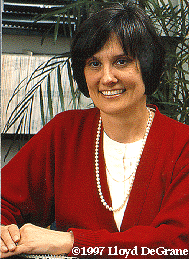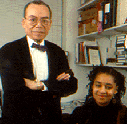
The University of Chicago Magazine
April 1997

Facing future challenges with firm traditions
 SSA Dean Jeanne Marsh
SSA Dean Jeanne Marsh
Continuing its series of talks with Chicago movers and shakers, the U of C Magazine spoke with Jeanne Marsh, dean of the School of Social Service Administration.
With a doctorate from the University of Michigan, Marsh joined the SSA faculty in 1978. Since becoming dean in 1988, Marsh has focused her efforts on keeping the SSA current with changing directions in social work while insisting it maintain the values of promoting a "just, humane" system of social welfare.
People often think of the SSA primarily as a training ground for social workers. Are they right?
That's one thing we do. SSA is a national and international resource for knowledge and talent in social welfare and social services. It does prepare social workers: social workers who tend, disproportionately, to become leaders not only in their professional rank but also in promoting ideas that change the character and the nature of their field.
Has the fact that larger numbers of social-work graduates now enter private practice or join for-profit groups affected how social work is taught at the SSA?
It's true that many social services-nursing homes; day-care centers; counseling services, especially those provided by employers-are increasingly becoming for profit. And we're very interested in studying these changes and what they mean in terms of the quality of service. But there's also a recognition that, regardless of how a program is funded, there are certain consistent characteristics of quality service, and those are what dominate the structure of our curriculum.
So there's no danger that the SSA will lose sight of its original mission, training students to work with the disadvantaged?
Right. This school has always maintained a strong tradition to address the disadvantaged in society. It's in our mission statement. Schools without such a strong tradition may tend to focus more on training private practitioners who only deal with clients who can afford to pay for their services, but that hasn't happened here.
You've described the SSA as a "a loner or a leader" in social-service education. What sets you apart?
One thing is the long tradition I spoke of. The school began nearly 100 years ago at a time of great social ferment, really at the dawn of social institutions that would shape our current social-welfare system. When you recall the founding mothers of this school, such as Edith Abbott and Jane Addams, and their commitment to shaping a just, humane system of social welfare, it really hits home how vital it is to maintain that commitment.
Beyond that, the SSA stands apart in the significant breadth of its research and teaching, from delivering services to individuals to developing policies that determine what kinds of services those individuals receive.
Along with our breadth is a sharpness of focus--an emphasis on rigorous critical analysis and thought. So that our graduates gain a real respect for evaluating what they're doing, asking the hard questions, and then using that information to improve the services being provided. I think it's that capacity to take a hard-nosed look that tends to propel them into positions of leadership.
But isn't social service about more than thinking critically? Aren't compassion and empathy also essential skills?
That's one reason why we require that our students have experience in the field. We do have students who come in the door and say, "I want to be a social-welfare policy wonk and I really don't want to spend my time at agency X working with this difficult client. It's not that much fun. What turns me on is regression models." And we say, "No, you have to sit down with Mrs. Jones and work through her situation and then do the regressions as well. But when you look at those results you'll always think about Mrs. Jones; you'll consider the human factor."
And the reverse also holds. The student who goes on to work with Mrs. Jones as a professional should gain a better understanding of the structural and institutional policy constraints that may limit her ability to help. That understanding may also give the student a capacity to envision ways of helping Mrs. Jones and others like her by joining or mobilizing efforts to change policies so that her life will improve.
How has the impact of welfare reform been felt at the SSA?
Of course, studying the national impact of those reforms will be a focus of a lot of our faculty's research. But I think we should also make an impact in terms of offering continuing-education opportunities to the social workers dealing with the new system. That's something we've already had experience with through our Management Institute, where we set up workshops for agencies going through organizational changes to help them learn the latest knowledge that's available.
With welfare reform, the shift of responsibility to the state level and the requirement that recipients obtain employment vastly changes the demands on workers who'll be delivering these programs. What we and other schools are trying to do is to open a dialogue with state officials-discussing their training needs, making sure they really understand that you can change a policy at the top, but unless you have people who can deliver it at the bottom, it's not going to make any difference.
In 1996, you won the National Association of Social Workers' research-excellence award. How do you balance your research with your duties as dean?I think the answer is "not well enough." But my goal has been to at least preserve a little time to devote to my research and not to let the flame go out.
It's certainly consistent with the values of this institution for administrators to continue their scholarly research. I also teach, and both those activities really make me a much better, more involved administrator. You see very clearly how decisions being made at one level affect the others. But the incentives are also strong from a personal perspective. What brought me here to begin with was the desire to teach and do research. It just wouldn't be fun to let that go."--T.A.O.
In this department:
Also in the Journal:
Plus items For the Record.
Go to:
- INVESTIGATIONS
- CHICAGO JOURNAL
- EVENTS
- LETTERS
- CHICAGOPHILE
- Feature story, "Just what the doctors ordered"
- Feature story, "Top of his game"
- Special Report, "Reel scholarship"
- Feature story, "Northern exposure"
- CLASS NEWS
- DEATHS
- BOOKS BY ALUMNI
- IN THE CLUBS
Return to April 1997 Table of Contents
